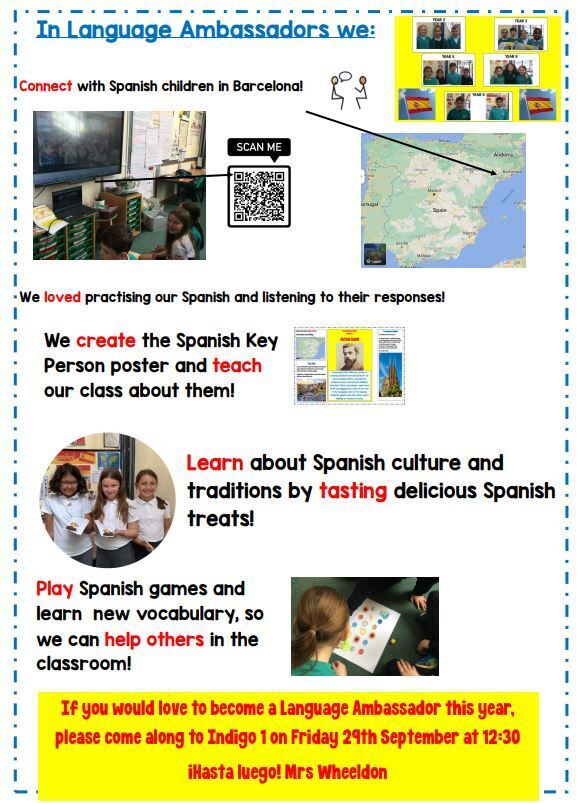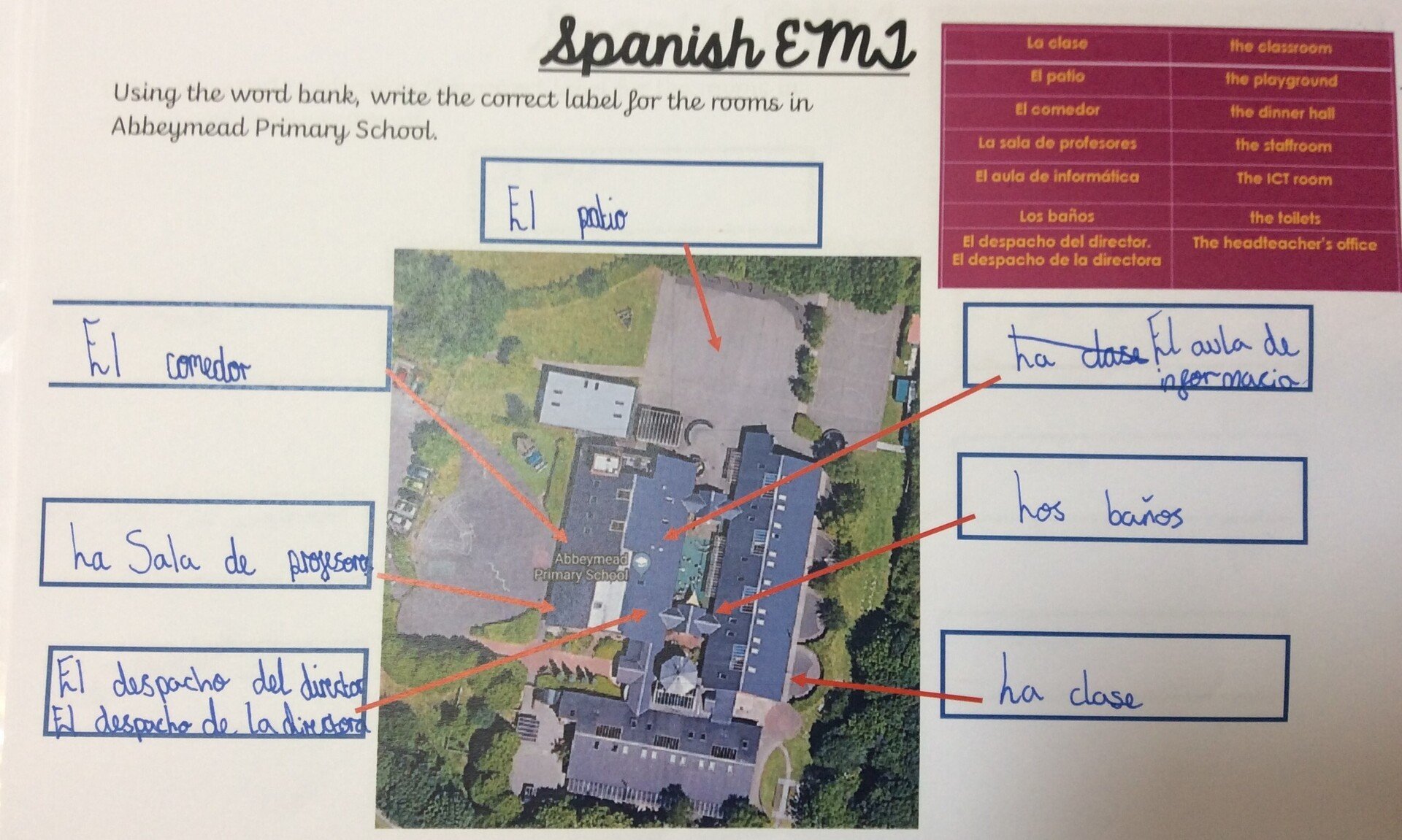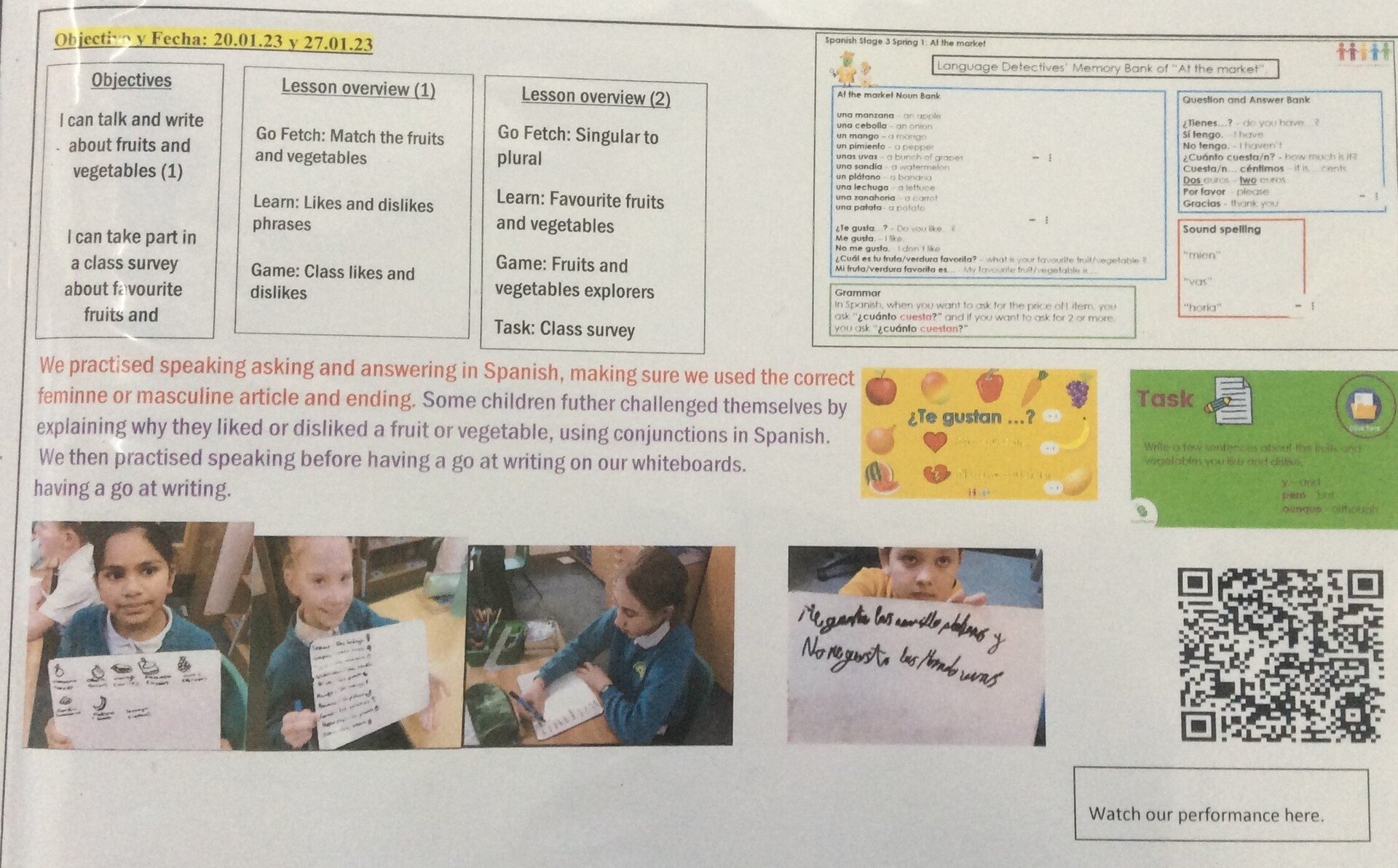MFL - Spanish
Intent
At Abbeymead, we want our pupils to be empowered by having the knowledge of learning and speaking another language to live in an interdependent world. Learning a language, helps us to develop other key skills such as intercultural understanding, empathy and appreciation of diversity. It can develop our critical thinking skills and problem solving skills. We want our children at Abbeymead to not only be able to communicate in other languages, but as importantly, to explore different cultures in more depth in order to become a true global citizen and be ‘ready for life’.
Languages in KS2, will develop the 4 key skills of learning: listening, speaking, reading and writing, with a very large emphasis initially on listening and speaking. Children will progress from Year 3 by being able to say a few short phrases, to being able to take part in a conversation and clear enough for a native speaker to understand, by the end of year 6. We will be using 'Primary Languages Network' to implement our teaching, which is a complete online resource, with full planning, links to cross curricular events and activities and full tracking and assessment tools.
We haven't forgotten about EYFS and KS1! Although teaching of a modern foreign language (MFL) is not statutory, we do encourage our pupils to take part in being 'Language Explorers'! This is also part of the fantastic PLN and helps children to become Language Detectives in KS2. The main activities are focused around listening and joining in and most importantly, having fun. We call it 'Education of the ear'; to develop an awareness of languages, sounds and other cultures around us. Non specialist teacher and TAs are supported by using native speakers videos and sound files.
Not only will children learn through regular lessons, but also by a wider and more authentic way of learning. This year we will be introducing E -Twinnning, in order to establish a link with a partner school, to provide children with a native speaker and improve their skills in all 4 areas. Furthermore, there will be planned projects across the academic year, to enable children to investigate Spanish further.
Learning another language gives children a new and broader perspective on the world, encouraging them to understand their own cultures and those of others.
Scheme of Work Overview
In 2020, we invested in a new Languages Scheme called Primary Languages Network (PLN). PLN’s mission is to empower all teachers and schools to be able to establish effective “primary” focused foreign language teaching programmes. Through native speaker sound clips, videos, games and a range of assessment tools, it allows the teaching and learning of Spanish, effective and accessible for all teachers and pupils. It also ensures that the learning is creative, purposeful and memorable for all learners.
Further information on Primary Languages Network
Please see below the overview, along with the relevant Knowledge Organisers, DfE AT unit map, Core Skills Progress and Phonics Map. We ensure that the Phonics, Vocabulary and Grammar focus is taught through every lesson, so children begin to have an understanding of these features in other languages.
End of Year Attainment Statements
Progression in vocabulary acquisition, grammar, and phonics, is planned for and built in across the 4 stages.
Language learning skills and links between languages and literacy are explored age and stage appropriately.
Within the body of the lessons there are planned for /suggested opportunities to sing, play games, perform, develop extended writing (Rainbow Writing), keep a record, and make links across the curriculum.
End of Year Attainment Statements
Rolling programme
As Spanish is new for 2020, we are currently implementing a 'rolling programme'. Please see details below and click on the overview to see the KS2 curriculum design.
2020-2021 - 1st year: all years at Stage 1(S1)
2nd year: Y3 at S1,Ys 4-6 at S2
3rd year: Y3 at S1, Y4 at S2, Ys 5+6 at S3
4th year: all years at appropriate stage
KS2 Spanish Curriculum Overview
Language Ambassadors
Examples of Pupils' work! iQué increíble!
Year 3
Year 4
Year 5
Year 6
Learn with us!
Have a look at our wonderful KS2 pupils speaking and listening in Spanish! Can you be a 'Language Detective' and understand some of what is being said? (Click on the different year groups to open the video)
Year 3 - European Day of Languages Song
Home Learning Support
This will compliment the work that would have been happening in class and gives pupils the opportunity to revisit the target language. Click on your child's year group below.
SMSC In Spanish
Spiritual - MFL supports Spiritual development by creating a deeper understanding of cultures, traditions and beliefs of other countries. In Abbeymead, this is by learning about a range of festivals that take place across Spain. Children have the opportunities to reflect upon these traditions and make links to our own traditions in the UK.
Moral - MFL supports Moral development by creating a curiosity of how other people in other countries and societies live. It enables pupils to appreciate our own law and country and reflect upon personal behaviour and behaviour of others.
Social - MFL supports Social development by gaining insights into the way of life, cultural traditions, moral and social developments of other people. Pupils social skills are developed through group activities and communication exercises, along with listening skills which are improved through native speaker lessons.
Cultural - MFL Supports Cultural development by gaining insights into cultural traditions, key figures and historical sights. It helps break down stereotypical views and discrimination against other races and cultures.
How can I support my child with languages?
The foreign language learning your child experiences at school should be more than enough to set them on their way. However, you might like to support their learning at home by trying some of the following:
1. Take an interest, and learn with your child
Learn alongside them: find out the language they are learning and get them to teach you some key words and phrases. They might like to make a simple poster illustrating key words and phrases, or use sticky notes to label everyday objects in a foreign language. Another good idea is to create a ‘new words’ dictionary for them to record all the new things that they have been learning. You may want to invest in a bilingual dictionary for them to look up further words — there are a great many ‘child-friendly’ versions of these available.
2. Make it multimedia
Why not find books, films or songs in the language they’re learning? These can be a wonderful way to learn a language without even realising it. Early-readers or lift-the-flap books are brilliant for learning a new language. The Internet is perfect for bringing some cultural learning into your home, allowing as it does access to videos, radio/audio and images from all around the globe. It has never been easier to expand your child’s horizons. There are also many games accessible on line (many of which are free) to help engage your child at home as well as websites (listed below) that include games, eBooks and links to other foreign language sites too.
3. Take a trip
Have a look for a local restaurant, monument or tourist attraction that have language links. It could be a local Spanish restaurant where parts of the menu are in Spanish! Have you ever been on holiday to a different country and heard the different languages being spoken? We would love to hear all about it so please do send your child in with anything you have discovered!
4. Make it fun
Above all, make any additional language learning you do at home fun, practical and supportive. Learning a new language can be a little daunting at first but with the help of parents and schools, it needn’t be the case. Even playing simple games (such as 'Snap', 'Guess Who', 'Snakes and Ladders') and adding an element of a foreign language (such as counting, colours or even just answering yes and no) could be a wonderful aid.
Further support and useful weblinks
A good way to help your child is to use some of the online resources that are available.
- Duolingo — a fun and effective way to learn languages
- Languages pages from the BBC
- Little Red Languages (free languages resources and activities)
- The Government’s languages curriculum booklet
Mead Road, Gloucester, Gloucestershire, GL4 5YS
Tel: 01452371710
Email: secretary@abbeymead.gloucs.sch.uk






